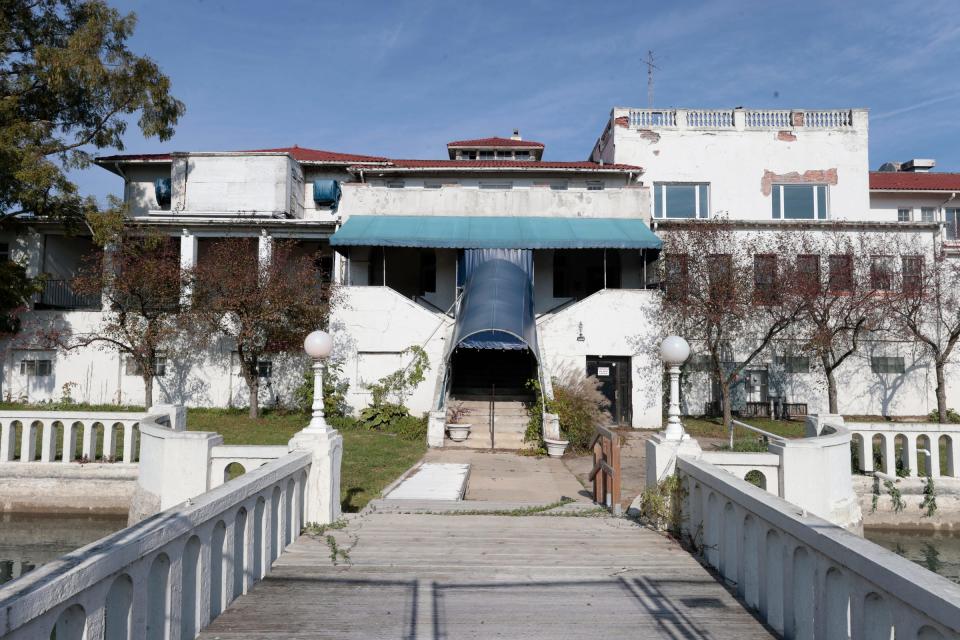Belle Isle Boat Club can be saved. Saying otherwise is a cop-out | Letters to the Editor
When the State of Michigan leased Belle Isle Park from the City of Detroit in 2013, this obligation was also to the citizens of Detroit and residents of metro Detroit who have used the island as an important place for recreation for generations. This responsibility is to maintain the historic island, and ensure that its integrity remains intact during the 30-year operational lease.
Belle Isle Park is listed on the National Register of Historic Places, and the Detroit Boat Club building is a contributing building to this National Register listing. As such, no federal funds should be used to damage a building listed or eligible for listing to the National Register.
But the Michigan Department of Natural Resources has proposed the demolition of the historic boathouse.
One of the DNR's arguments in favor of demolition is that there have been no uses identified for the building. There is no evidence that the DNR has sought options for additional or alternate uses for the boathouse.
Until the partial roof collapse in 2022, the Friends of Detroit Rowing were the building's sole tenants.

There are several exciting uses for the boathouse that are needed on the island that would support the building's reuse, while preserving the connection to the oldest rowing club in North America:
Welcome center: Currently, there is no welcome center to greet visitors to the Island. This facility has beautiful spaces on the second and third floors that could serve as an orientation point for visitors while telling Belle Isle’s unique history.
Transportation hub: A multimodal transportation plan is being developed for the island, and the boathouse could serve as a central location for vehicle parking for visitors renting bicycles and other non-motorized vehicles to travel around the island. Off-island bus service could be focused at the boathouse, with the building's large parking lot. Located adjacent to the entrance to the island, a transportation hub at the boathouse could orientate visitors to the mobility hubs proposed for the island in the non-motorized transportation master plan.
Ferry dock: The DNR is proposing to develop ferry service connecting several existing state and city parks along the Detroit River. The boathouse's existing dock could provide convenient and centralized embarkation/disembarkation location for ferry riders that would connect into the island’s non-motorized mobility hub network.
Iron Belle thru-hiker/rider center: As Michigan’s preeminent trail — stretching more than 2,000 miles from the western end of the Upper Peninsula to Belle Isle — the starting/ending point of the Iron Belle Trail is at the eastern end of the island, but there are no facilities for these users. This facility could provide information for trail users, showers, lockers and other desired amenities.
A restored Detroit Boat Club building could continue to serve as a place for the Friends of Detroit Rowing to host regattas and events, while the upper floors of the building could continue to be rented out as a special event venue. In 2019, before COVID-19 closed events, the group generated over $100,000 in rental fees from the operation of the facility.
The DNR has to recognize its responsibility as a caretaker of Detroit’s history, and that the boathouse can easily serve several additional needed functions on the island, if it just considers the alternatives. Hiring a consulting team in 2022 that had limited experience with historic properties is the reason that cost estimates for rehabbing the building went from $16 million in 2019 to over $43 million in 2022. Experience dealing with historic buildings is a must, or the high costs estimated by the inexperienced will add to the narrative that demolition is the only option.
The DNR is focused on natural resources and recreation. Historic properties do not fall into its normal thought process, and the easy way out is the argument that it saving the boathouse is too expensive, and there are no uses to preserve it. It is clear that stacking the deck against preservation is the DNR’s best option, if its desired outcome is demolition.
Saving historic buildings is never easy, but saying that it can’t be feasibly done is a cop out. There are too many former un-rehabable "corpses" in Detroit that prove otherwise.
Arthur F. Mullen, AICP
The writer is an urban and preservation planner and a resident of Grosse Pointe Park
This article originally appeared on Detroit Free Press: Don't demolish Belle Isle Boat Club: Here’s 5 big ideas for it

